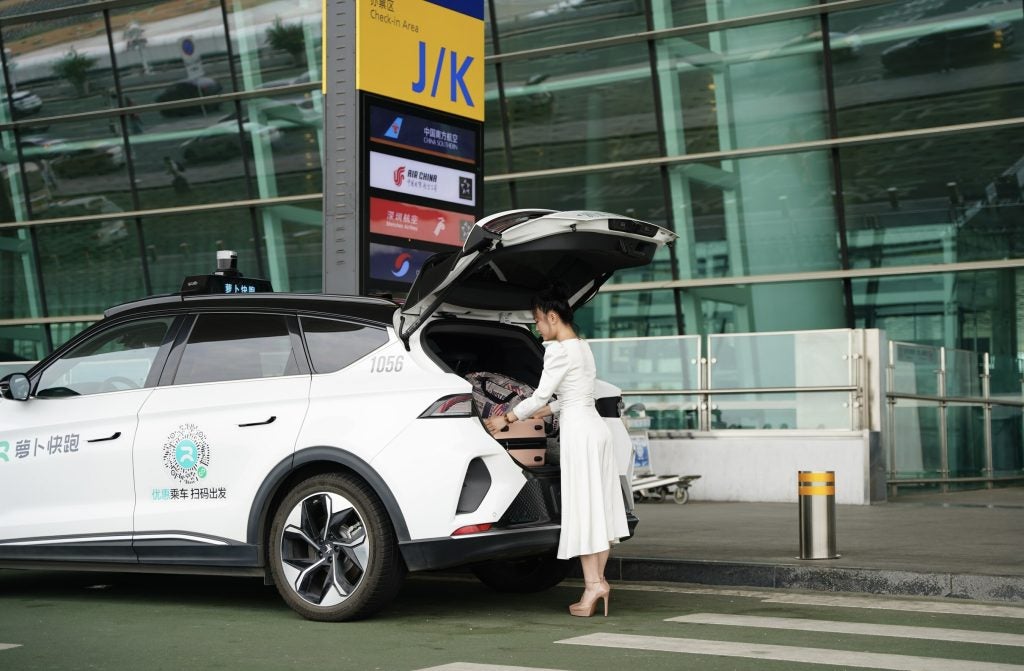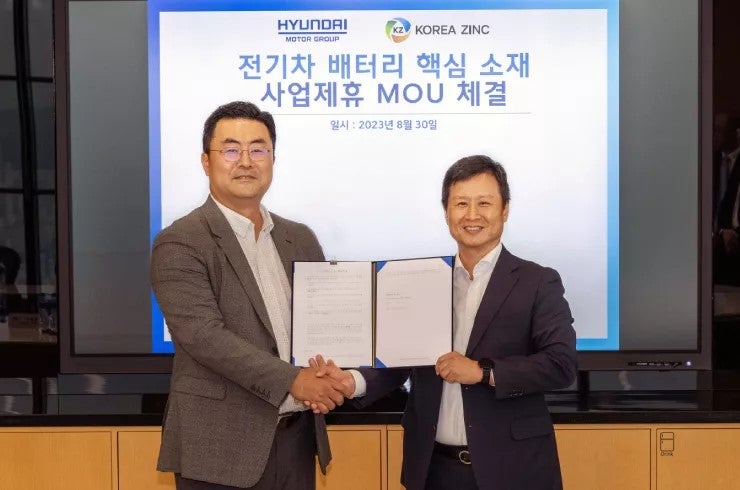
Each week, Just Auto journalists select top tweets that summarise the social media buzz in our sector, underpinned by GlobalData’s analytics. These social media signals help us understand brand sentiments and the themes driving conversations on social platforms. This new, thematic coverage is driven by our underlying Disruptor data which tracks all major deals, patents, company filings, hiring patterns and social media buzz across our sectors.
Korea’s July
Domestic sales by South Korea’s five main automakers combined fell 5.8% year on year to 115,358 units in July 2023 from 122,404 a year earlier, according to preliminary wholesale data released individually by the companies. As usual, the data did not include sales by low volume commercial vehicle manufacturers or imported vehicles which will be covered in a separate report later. The slowdown followed a strong first half with declining sales most prevalent among the smaller brands. It also came after a series of interest rate hikes by the central bank over little more than a year, to 3.5% from 1.25% in early 2022. Hyundai was the best performing domestic automaker last month with sales rising 2% to 57,503 units while Kia volume fell 7% to 47,964 units.
China’s June
The Chinese market accelerated strongly in June. Light Vehicle (LV) wholesales came to 2.58 million units with growth of 3%. At segment level, total PV wholesale volume reached 2.31 million units with growth of 2% in the month. At the same time, the Light Commercial Vehicle (LCV) sector recovered well, increasing by 14% year-on-year (YoY) to a total of 267k units. On a month-on-month (MoM) basis, PV sales increased by 11%, and LCV sales also increased by 3% in June. Since the beginning of this year, cumulative LV wholesales have reached 13.02 million units, an increase of 3%. On the production side, the total LV build in June was 2.46 million units, increasing by 1% YoY and 10% MoM. At the vehicle type level, PV output (89% of total LV production) was 2.19 million units in June, which was 115K less than the wholesale volume. But PV output in June was down by 1% YoY which was the first fall seen so far in 2023. LCV output was 263k units in June, up 23% YoY and increasing by 11% YTD.
US, too
Although somewhat flattered by weak year ago sales, the US market has grown year-on-year for the 12th consecutive month. US Light Vehicle sales totaled 1.30 million units in July, according to GlobalData. The annualized selling rate increased slightly from 15.7 million units/year in June, to 15.8 million units/year in July. Meanwhile, July’s daily selling rate was estimated at 52,200 units/day, compared to 53,000 units/day in June. Therefore, although July broke a run of four consecutive months in which volumes had ranged between 1.35 and 1.38 million units, this streak would surely have continued had July had one more selling day – it had 25, compared to 26 in June. According to early estimates, retail sales totaled around 1,076,000 units, while fleet sales accounted for approximately 228,000 units, representing around 17.5% of total sales.
And the UK
The UK new car market grew 28.3% year-on-year in July with 143,921 new vehicles registered, according to the latest figures from the Society of Motor Manufacturers and Traders (SMMT). July was the best July performance since 2020, when pent-up demand for new cars was unleashed following three months of lockdown during the pandemic. Despite this continuous growth, however, the overall market year to date remains behind pre-pandemic levels. Company (fleet) registrations drove the growth, as uptake by large fleets increased 61.9% to 80,961 units and business registrations rose 28.7% to 2,915 new vehicles. Private demand remained stable at 60,045 units (up 0.3%).
UAW (and Unifor) v Big Three
For the first time since 1999, the UAW and Unifor’s contract agreements with Stellantis, GM, and Ford are set to expire at the same time in September. Negotiations are expected to be contentious with multiple scenarios at play. The UAW’s four-year contract expires on 14 September while Unifor’s 3-year agreement expires on 18 September. Bargaining with the Detroit 3 started this month with job security, higher wages, and pensions being the main priorities for discussion. Back in 2019, the UAW decided to strike against General Motors – the strike lasted 40 days, becoming the longest national walkout against the automaker since a 67-day strike in 1970. Nearly 50,000 workers became involved and shut down 33 manufacturing plants across the US, which GM reported cost them 300k units of production and US$4 billion. GM’s Silao and Ramos Arizpe plants in Mexico as well as its Oshawa plant in Canada were also impacted due to a parts shortage from the strike.
Data driven dings
With the automotive landscape constantly changing, some repair shops are struggling to keep up. An online body shop marketplace addresses the issue. Finding the right body repair shop for a damaged vehicle can be a tiresome process, especially for EV owners who own cars with complex systems which require specialist fixing tools. Alongside this, many repair shops lack the training or equipment to correctly fix damaged EVs. Fixico was launched as a marketplace for drivers to find the best body repair shops for their vehicles. The company enables businesses to make data-driven repair decisions, to fully optimise, control, and track their repairs. We spoke to Derk Roodhuyzen de Vries, CEO and co-founder of Fixico to discuss the company’s history as well as to touch on the services the company provides to repair shops.
BW EV deal
BorgWarner has agreed a deal with an unnamed “global automotive thermal systems supplier” for high voltage coolant heaters (HVCH) for electric vehicles (EVs). The heaters would be used on three EV platforms made for an also unnamed “major OEM” and would ensure optimal battery and cabin temperatures. The company said its 800V HVCH is a compact and lightweight design with fast heating times, ensuring efficient heat transfer and fast charging. Safety features prevent overheating and will automatically turn the heater off.
HMG Qualcomm Cockpit
Hyundai Motor Group (HMG) has agreed to collaborate with US semiconductor manufacturer Qualcomm Technologies on cockpit infotainment systems for its forthcoming purpose built vehicles (PBVs). Qualcomm said the automaker would use its latest Snapdragon automotive cockpit platforms in its PBV infotainment system to provide a “holistic, seamlessly connected and smart user experience”. The two companies have worked together since 2011 “to provide a seamless in-vehicle mobile communications experience” using the Snapdragon automotive connectivity platform which Qualcomm claimed “enables innovative vehicle designs by offering a stable and validated modem technology which provides improved performance and allows for integrated solutions for connected car designs”.
Seat. Belt. Reinvented
ZF has introduced a new seat belt system which ‘adjusts’ occupants into an optimal seating position before a potential collision. Equipped with sensors, the system responds promptly to potential hazards. The core is the ACR8 electromechanical belt tensioner which reduces belt slack and can alert the driver through vibrating the belt. During a crash, the seat belt and airbag work in tandem as protective systems. The seat belt restrains the upper body initially, and then releases, guiding the occupant towards the airbag.
Californians lawyer up
Three California Tesla owners have filed a class action lawsuit against the automaker, alleging false advertising of electric vehicle (EV) driving ranges. The suit, filed in California, referred to a recent Reuters article exposing Tesla’s “Diversion Team” in Nevada, allegedly cancelling range related appointments due to mounting owner complaints. Tesla is accused of breaching vehicle warranties, committing fraud and engaging in unfair competition. A lawyer representing the Tesla owners said Tesla had responsibility to deliver products which performed as advertised.
Good news supplier
Aptiv has reported second quarter 2023 earnings of US$0.84 per share or $1.25 excluding special items. Revenue rose 28% year on year to $5.2bn and net income was $229m with earnings per share of $0.84. This compared to a net loss of $61m and $0.23 per share a year ago. Adjusted operating income margin was 10.2% (5.3%) and adjusted operating income $530m compared to $213m. Adjusted EBITDA margin was 13.4% and adjusted EBITDA $695m.
And Visteon
Visteon said second quarter 2023 sales rose 18% year on year to US$983m, helped by higher customer vehicle production and recent product launches. The supplier noted it had made lower semiconductor open market purchases and associated recoveries had reduced as supply constraints continued to ease. Total industry production was up 16% and vehicle production at top customers increased 12%. Gross margin was $104m and net income $20m or $0.70 per share. Adjusted net income was $34m or $1.18 a share. Adjusted EBITDA was $90m or 9.2% of sales, up $11m helped by higher volume but offset by an exceptional charge of $15m related to a customer’s recall programme. The company said it won a “record” $4bn of new business in the first half.
Magnificent Magna Module
Magna has started production of a new modular eDecoupling unit. The product will be used in battery electric vehicle (BEV) models made by an unnamed “German premium original equipment manufacturer (OEM)”. The eDecoupling unit is electro-magnetic and is a bolt on, stand alone module for BEVs. It works mainly as an electromechanical device which disconnects the electric motor from the driveshaft, reducing energy consumption and boosting efficiency.
VW Slice of XPeng
Each week, Just Auto editors select a deal that illustrates the themes driving change in our sector. The deal may not always be the largest in value, or the highest profile. But we select it because of what it tells us about where the leading companies are focusing their efforts, and why. We pick apart the deal itself, and the industry theme behind it. This new, thematic deal coverage is driven by our underlying Disruptor data which tracks all major deals, patents, company filings, hiring patterns and social media buzz across our sectors. The deal: Volkswagen will pay US$700m for a 5% stake in electric vehicle (EV) startup XPeng and it is planned the two companies will jointly develop two EVs to be sold as VW models in China by 2026.
Hyundai stake and chips
Hyundai and Kia would invest $30m and $20m respectively in Tenstorrent’s latest fundraising round which was expected to raise $100m to help the Toronto firm accelerate design and development of AI chiplets and its machine learning (ML) software schedule. HMG planned a deal with Tenstorrent to allow it to integrate the company’s technology and experience into future products.
Automaker adding chatty bot
Chinese SUV maker Great Wall Motor appears set to become the first automaker to adopt Beijing-based Baidu’s artificial intelligence (AI) software in its vehicles which enables communication between driver and vehicle. GWM, based in Baoding in China’s Hebei province, said it had worked with Baidu to develop vehicles featuring the search engine giant’s chatbot system known as Ernie Bot, which is often compared with Microsoft’s ChatGPT.
Have a nice weekend.
Graeme Roberts, Deputy Editor, Just Auto





